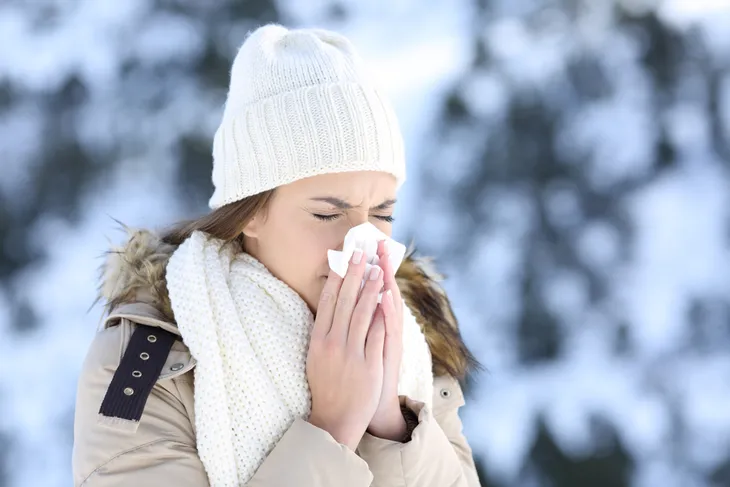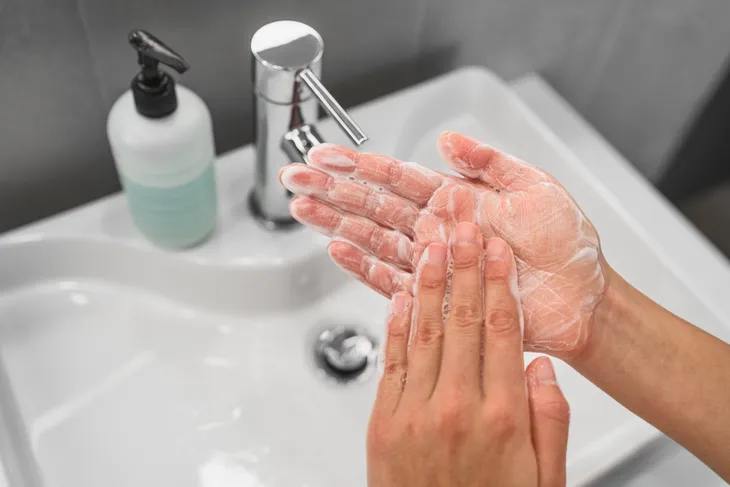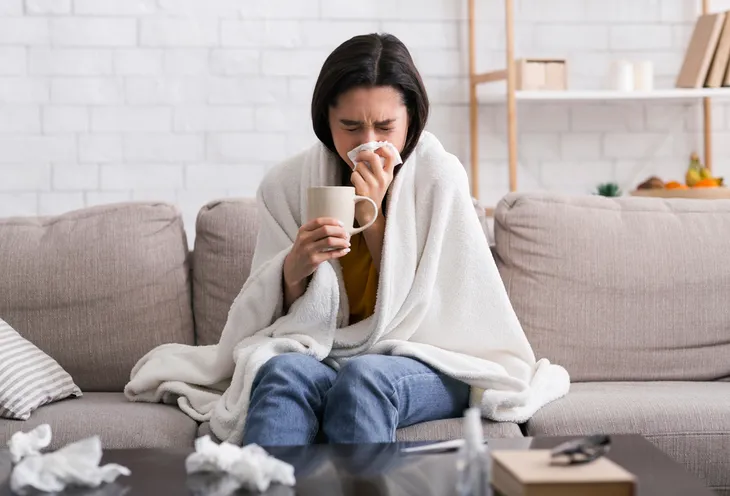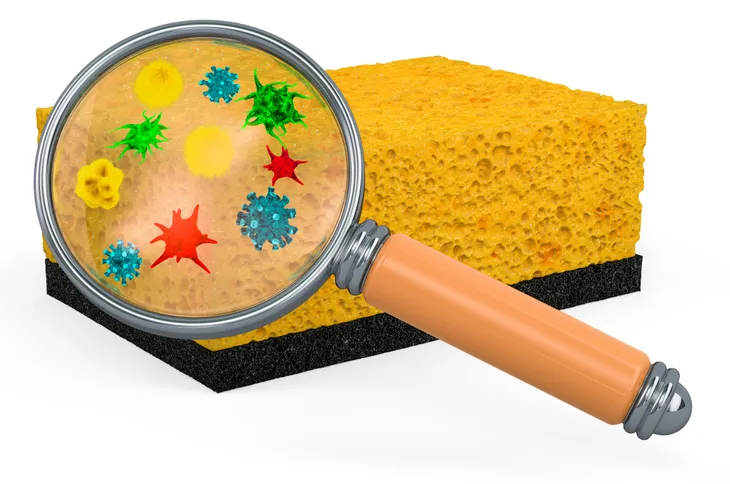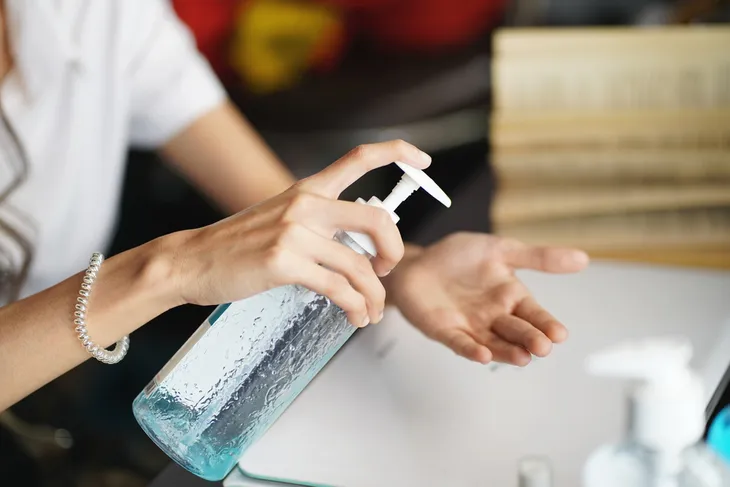- Germs are microscopic living organisms that can easily creep into our body to spread disease and sickness.
- There are so many myths and misconceptions about colds, the flu, and just spreading and catching germs in general. But what’s the truth?
- From things like drinking orange juice when sick to starving a fever, we’re breaking down some of the ickiest myths about germs.
When we think of germs, the first thing that comes to mind is likely the icky sentiment of bugs, viruses, and the general grossness of it all. While it’s true, there’s nothing nice about germs, they aren’t what most people think they are. Germs are actually living organisms. They are alive which is pretty cool! The not so great part is that they can cause disease.
Kid’s Health explains what makes them dangerous is that they are so small — microscopic to be exact. They’re able to creep into our bodies without being detected. We often don’t realize we’ve picked up any germs until the symptoms appear. Since germs are found all around the world and affect us all, let’s talk about some common myths surrounding them and what the truth is…
Cold Weather Causes Sickness
One of the biggest misconceptions about catching a cold is that going outside not properly dressed makes a person sick. While the sentiment of trying to get people to dress properly is good, the science behind it isn’t true. A cold is caused by a virus, in fact colds are the result of many different viruses. Rhinoviruses are the most common cause and responsible for more than half of all colds and cold-like illnesses, says Medical News Today.
So what is the link between colds and cold weather? Some research has found that rhinoviruses may replicate more efficiently at temperatures lower than 37-degrees or 98.6-degrees Fahrenheit (the average core body temperature in humans). “The temperature inside the nasal cavity is approximately 33-degrees Celsius, which may make it an ideal breeding ground for rhinoviruses,” writes the source.
Other factors like spending more time indoors, reduced vitamin D levels, or a decreased immune function in cold weather could all play a role in spreading colds in the winter months.
Hot Water Cleans Best
Most of us use hot water when we go to wash our dishes, wash our hands, or clean anything really. Why is that? It’s likely because we believe that the hot water does a better job of getting rid of any germs or bacteria. However, that’s not true! According to a study which analyzed people’s hands after washing at various temperatures, cool water washes away the same amount of bacteria as hot water.
Prevention talked to Donald Schaffner, a food scientist at Rutgers University who says the faucet water would have to be above 100-degrees Fahrenheit to effectively remove all the bacteria on a persons hands. Obviously a temperature that high would burn us, so what’s more important is using soap, notes Stephen Calderwood, chief of the division of infectious diseases at Massachusetts General Hospital. Soap removes more bacteria than any amount of hot water alone by acting as a surfactant.
The Flu and a Cold are the Same
While they might share a couple similar symptoms, a typical cold resembles more of a sore throat, runny nose, sneezing, and possibly a cough. The flu on the other hand is much more dangerous and comes on fast and furious. “In the United States alone, 36,000 people [pass away] and more than 200,000 are hospitalized each year because of the flu,” warns Denise Pate, MD, board-certified internal medicine physician at Medical Offices of Manhattan to LiveStrong.
Certain populations have a heightened risk for complications from the flu. The Centers for Disease Control and Prevention (CDC) lists seniors, infants, pregnant women, and people with a compromised immune system as being high risk. People with certain medical conditions such as heart disease, cancer, or diabetes should also be wary of complications, notes LiveStrong.
“Even if the shot doesn’t prevent you from getting the flu, it can decrease the chance of developing severe symptoms,” says Dr. Pate to the source.
Healthy People Don’t Need the Flu Vaccine
While it’s more important for people with a weak immune system to get vaccinated against things like the flu because their risk for complications is higher, even healthy people need vaccines. They work with our immune system to help fight an infection. And “anyone is susceptible to contracting the flu, including healthy people,” says Dr. Pate when talking to LiveStrong. In fact, once a person is infected with the flu, they become contagious and can spread it to other people.
The CDC recommends every person get the flu vaccine (each season) once they are above the age of 6-months old. It’s not enough to just get it once, it needs to be done each year. “The influenza virus mutates, so getting vaccinated each year is important to make sure you have immunity to the strains most likely to cause an outbreak,” explains Dr. Pate.
You Can Starve a Fever
While a person likely doesn’t feel like eating much when they have a fever, it’s not a good idea to “starve” a fever in order to reduce the temperature. When a person has a fever, it means their body is fighting an infection. During this time it needs nourishment and rest, so forgoing food isn’t the best bet for a speedy recovery, says Pauline Jose, MD, a clinical instructor at UCLA and family medicine specialist at pH Labs, a national not-profit health information organization to LiveStrong.
No matter what the illness is behind the fever, “your immune system needs nutrients and energy to do its job, so eating and getting enough fluids is essential,” says Dr. Pate. Another key ingredient for recovery is hydration. Make sure to drink lots of water. You could also try decaffeinated tea and broth.
You Need Antibiotics for the Flu
Colds, coughs, earaches, and sore throats are all caused by viruses. Unfortunately, antibiotics have no effect on viruses. They are designed to fight bacteria, so they cannot help a person recover from these infections. Viruses like the flu are completely different organisms, explains LiveStrong.
“Supportive therapy, antiviral medications (not all viruses have medications) and preventative vaccines are the proper approach for treating viruses,” says Dr. Pate. However, people can develop a bacterial infection like pneumonia during a viral infection if their immune function is challenged, adds Dr. Jose. If this happens, an antibiotic may be helpful.
A Toilet is the Germiest Thing in Your House
When asked what has the most germs in a person’s home, most people probably think of the toilet, or the very least the bathroom. You might also believe it’s the one place where germs are most easily spread. Wrong! According to WebMD, the kitchen is actually where most of our household germs live.
The reason for this is because not only does the kitchen see a lot of action with cooking and cleaning, but it is where the kitchen sponge is. Wait…doesn’t the kitchen sponge clean surfaces?! Well that’s true, but what most people probably don’t know is that the kitchen sponge needs to be changed daily or very frequently.
“Sponges pick up bacteria if they’re not cleaned right,” writes WebMD. The source goes on to advise people to actually zap their kitchen sponge in the microwave for 2-minutes every day and replace it every two weeks. You might also want to consider using rags that can be tossed in the washing machine or cleaned with bleach.
The Flu Vaccine Causes the Flu
Another very common myth about the flu shot is that it causes the flu. People will say they got the flu shot once and it made them sick, so they aren’t getting it again. The flu shot does not give a person the flu. It could be that a person picked up the flu soon after getting their vaccine, but the vaccine itself couldn’t have caused their illness. “The flu shot is made from an inactivated virus that can’t transmit infection,” says Dr. Pate when talking to LiveStrong.
It’s entirely possible that a person gets sick after receiving their shot because it takes about a week or two for the vaccine’s protection to kick in. People who experience flu symptoms after their flu shot were likely already on their way to getting sick, adds Dr. Pate.
Antibacterial Soap Works Best
There are so many different cleaning products on the market, it’s hard to know what to buy. There’s a lot of trial and error to figure out which one works best or what’s even necessary and what’s a waste of money. However, when faced with two different soaps, one that is just labeled as soap and the other is “antibacterial.” Which soap would you choose?
Most people would probably pick up the antibacterial soap thinking it is more effective against germs. WebMD points out that this fancy soap isn’t necessary. There is no evidence that shows fancy soap that claims to be “antibacterial” has any more effect on germs than plain old soap.
5-Second Rule
We’ve all heard about the “5-second rule” when food falls on the floor. And let’s face it, we’ve all been there at some point — eating a delicious snack or meal and a piece falls on the floor. Whoops! According to the “5-second rule,” if we quickly pick the food up it’s still okay to eat. Some of us might have even followed this rule before! But is it true?
WebMD warns that it’s best not to eat any food that has fallen on the floor. Germs can get onto food as soon as they hit the floor. While it might not make a person sick, it very well could so it’s not worth the chance. When in doubt, toss it out.
Gloves Prevent From Picking Up Germs
Germs are spread in more ways than just through droplets in the air. People can also pick them up off dirty or contaminated surfaces. This is why some people might think that gloves are beneficial, but the reality is, they don’t do much to deter from picking up germs because they simply act like a second skin. They’ll pick up the same amount of pathogens as our bare hands.
In fact, they can transmit and infect a person with harmful bugs if they touch an unclean surface and then your face, warns Flushing Hospital Medical Center. In order for them to be protective at all, a person would have to wash or change them as regularly as ungloved hands which as LiveStrong points out, basically defeats the purpose.
Gloves can be beneficial if carrying for (or in close contact) someone with a highly contagious illness, notes the CDC. Make sure to dispose of them when in contact with blood, stool, or bodily fluids. This also goes for touching “high-touch” surfaces like counters, tabletops, etc. Avoid touching your eyes, nose, and mouth with the gloves.
Vitamin C Cures Colds
You’ve likely heard someone recommend drinking lots of orange juice after catching a cold. Why is this exactly? Yet another well-circulated myth is that vitamin C is able to cure a cold. “Vitamin C is important for immune defense, and we need a good immune function for healing,” says Dr. Jose. However, research has found that taking vitamin C supplements daily only has a slight effect on the duration of a cold. The statistics show about an 8-percent reduction, according to the National Institutes of Health (NIH).
Vitamin C may be able to shorten the length of a cold and reduce the severity of symptoms because “it compensates for the increased inflammatory response and metabolic demand,” explains Dr. Jose. But if you’re already sick, there’s not much point in drinking a bunch of orange juice. It won’t do much to speed up recovery, says NIH. The best remedy for sickness is lots of sleep and good hydration.

